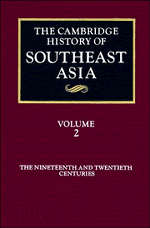Book contents
- Frontmatter
- PART ONE FROM c. 1800 TO THE 1930s
- PART TWO FROM WORLD WAR II TO THE PRESENT
- 6 Southeast Asia in War and Peace: The End of European Colonial Empires
- 7 The Political Structures of the Independent States
- 8 Economic and Social Change
- 9 Religious Change in Contemporary Southeast Asia
- 10 Regionalism and Nationalism
- Bibliographies
- References
8 - Economic and Social Change
from PART TWO - FROM WORLD WAR II TO THE PRESENT
Published online by Cambridge University Press: 28 March 2008
- Frontmatter
- PART ONE FROM c. 1800 TO THE 1930s
- PART TWO FROM WORLD WAR II TO THE PRESENT
- 6 Southeast Asia in War and Peace: The End of European Colonial Empires
- 7 The Political Structures of the Independent States
- 8 Economic and Social Change
- 9 Religious Change in Contemporary Southeast Asia
- 10 Regionalism and Nationalism
- Bibliographies
- References
Summary
World War II reduced the Southeast Asian economies, already weakened by the Great Depression, to their lowest levels in modern times. Warfare itself accounted for much of the destruction, particularly in Burma and the Philippines, where the Allied forces resisted longest and returned soonest. When the British retreated from Burma they blew up railways and refineries as they withdrew, and the American liberation of the Philippines employed massive concentrations of naval and aerial firepower; these operations probably accounted for most of the physical destruction in those two countries. By the end of the war Burma had lost all its oil refineries, 90 per cent of its boats, and 85 per cent of its locomotives (along with most of its rolling stock and bridges), while 70 per cent of its roads and most of its docks and factories were severely damaged. As one scholar put it, ‘both in internal transport and external trade, Burma was thrown back a century, without warning or previous preparation’. The Philippines was scarcely better off; much of the damage occurred during the 1945 liberation of Manila, in which the country’s industrial and modern services sectors—factories, ware houses, power plants, radio stations, telephone exchanges, newspapers, hospitals and universities—had been concentrated. By the end of the battle, the city was 80 per cent destroyed.
- Type
- Chapter
- Information
- The Cambridge History of Southeast Asia , pp. 467 - 528Publisher: Cambridge University PressPrint publication year: 1993
References
- 3
- Cited by



